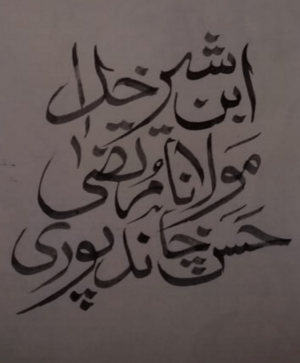Murtaza Hasan Chandpuri facts for kids
Quick facts for kids Murtaza Hasan Chandpuri |
|
|---|---|

Calligraphic name of Murtaza Hasan Chandpuri
|
|
| Religion | Islam |
| Alma mater | Darul Uloom Deoband |
| Personal | |
| Born | 1868 |
| Died | 31 December 1951 (aged 83) Chandpur, Bijnor, Uttar Pradesh, India |
Murtaza Hasan Chandpuri (1868-1951) was an Indian Islamic scholar. He followed the Sunni branch of Islam. He was a student of Ashraf Ali Thanwi, a well-known Sufi teacher.
About His Life
Murtaza Hasan Chandpuri was a student at the Darul Uloom Deoband school. He finished his studies there in 1887. He learned from important teachers like Muhammad Yaqub Nanautawi.
Later, he became a follower of Ashraf Ali Thanwi. This was part of his journey in Sufism, which is a spiritual side of Islam.
His Work as a Teacher
Chandpuri worked as a principal for many years. He led Islamic schools in places like Darbhanga and Moradabad. After that, he returned to the Darul Uloom Deoband school.
At Deoband, he first helped manage the education department. Then, he was put in charge of the preaching department. He retired from the school in 1931. He moved back to his hometown, Chandpur, Bijnor.
He passed away in Chandpur on December 31, 1951. His son, Muhammad Anwar, survived him.
His Students and Debates
Murtaza Hasan Chandpuri had many students. One of his famous students was Sulaiman Nadvi. Sulaiman Nadvi helped write a book called Sirat-un-Nabi. He also started the Shibli Academy, which is a research center.
Chandpuri also took part in discussions with other religious groups. These included Ahmadis and Barelwis.
What He Wrote
Murtaza Hasan Chandpuri mostly wrote articles and small books. He wrote these to defend his teachers and other scholars. These scholars included Muhammad Qasim Nanautavi, Rashid Ahmad Gangohi, Khalil Ahmad Saharanpuri, and Ashraf Ali Thanwi. They had faced accusations from another scholar, Ahmed Raza Khan Barelvi.
Most of Chandpuri's articles were put together in a collection. This collection is called Majmua' Rasa'il-e-Chandpuri. A historian named Nizamuddin Asir Adrawi listed some of his works. These writings often discussed religious topics and defended his beliefs.
Here are some of the titles of his works:
- Mirza'iyat Ka Khatma
- Qadiyaniyat Mai Qiyamat Khez Bhonchaal
- Mirza Aur Mirzaiyon Ko Darbar-e-Nabuwwat Se Challenge
- Mirzaiyon Ki Tamam Jamaton Ko Challenge
- Tehqeeq-ul-Kufr
- Taleem al-Khabir fi Hadith Ibn Kathir
- Qadiyaniyon Se 70 Sawalat
- Saa'iqa Aasmani bar Firqa Qadyani
 | Victor J. Glover |
 | Yvonne Cagle |
 | Jeanette Epps |
 | Bernard A. Harris Jr. |

